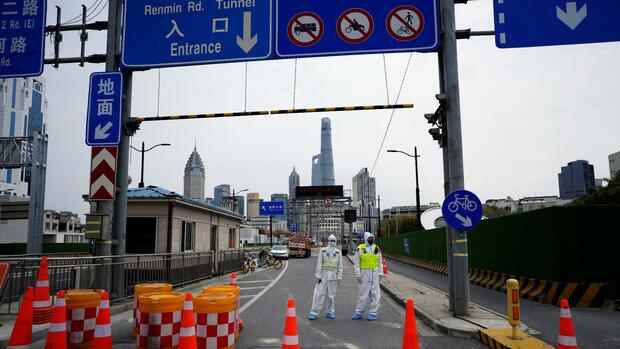Beijing The far-reaching lockdown in the 25 million metropolis of Shanghai could further aggravate the tense situation in global supply chains. There is also growing concern that the repeated lockdowns will put an additional strain on China’s already weakening economy.
The economic and financial metropolis has been in an extensive lockdown since Monday. First it was said that the districts east of the Huangpu River would be cordoned off for four days. As of Friday, downtown west of the Huangpu River should follow suit. The short-term nature of the lockdown is causing dissatisfaction among the population and companies in Shanghai. A nationwide closure of the city was denied on Saturday. On Sunday evening, the city administration then announced the disease protection measures.
According to calculations by a team of scientists from the Chinese University of Hong Kong, the Chinese government’s strict zero-Covid policy causes losses of 46 billion dollars a month. That corresponds to lost economic output of 3.1 percent. Those costs could double if other areas follow Shanghai’s example and oblige many residents to stay at home.
Maximilian Butek, head of the Shanghai branch of the German Chamber of Commerce (AHK) in China, is concerned about the actions of the Chinese authorities. He criticizes that the “often unforeseeable measures implemented overnight” and the consistent adherence to the zero-case policy are increasingly worsening the investment climate in China.
Top jobs of the day
Find the best jobs now and
be notified by email.
Citizens and businesses on the east side of the city had little time to prepare for the impending lockdown. Videos are circulating on social media, apparently taken in Shanghai on Sunday evening. They show empty shelves in supermarkets and fights over groceries.
In addition, many citizens are concerned that they will lose their jobs if they cannot come to work due to the lockdown. Financial industry employees are said to have stayed overnight in their offices in the lockdown-hit financial district to continue working.
People barely had time to prepare for the lockdown.
(Photo: AP)
The measures announced at short notice also caught some companies unprepared. The Shanghai Municipality has stressed that the factories can continue to operate in a “closed loop”, that is, in a bubble-like environment in which employees can continue to work, live and reside on the factory premises without leaving the premises.
However, due to the short notice of the lockdown, many companies hardly had time to react and, for example, to order workers into the factories. The e-car manufacturer Tesla, whose Gigafactory is located in the eastern part of the city, had to suspend production. The situation is also becoming increasingly “difficult” for other companies, says AHK manager Butek.
According to the Reuters news agency, the carmaker GM has even started letting employees sleep on the floor at the local factory for a short time so as not to have to stop production. GM declined to comment on the report.
The production of the joint venture between SAIC and Volkswagen is currently running at reduced capacity. In the run-up to the current lockdown, the company had already received several requests to seal off its factory premises for 48 hours. As a result, preparations have been made to be able to continue producing even during a longer lockdown.
The Thyssen-Krupp industrial group, which produces steering systems and dampers for the automotive industry in a plant near Shanghai, has so far been able to maintain production, the company said. The Bosch subsidiary Taixiang Vehicle Replaceparts is also continuing to produce because about 200 workers had agreed to live in dormitories at the site during the lockdown, a spokeswoman said. During the corona lockdown at the end of December in the 13-million metropolis of Xian, Bosch associates spent the night on camp beds at the site to secure production.
supply chains at their limits
Shanghai is one of the most important economic centers in China and is firmly integrated into global supply chains. The lockdown is therefore not only affecting the Chinese but also the global economy.
The airports and the important port of Shanghai should still be operational. Trade expert Vincent Stamer from the Kiel Institute for the World Economy (IfW) told the Reuters news agency that damage to global supply chains could be “limited”. “However, problems with transporting the goods to the port could also manifest themselves as longer delivery times for goods to Germany.”
>>Read here: Corona case numbers in China are rising to a record high – and endangering the country’s zero-Covid strategy
The international Swiss logistics group Kuehne + Nagel is currently rerouting sea freight bound for Shanghai to the nearest port in the city of Ningbo. For air freight, the company uses Zhengzhou Airport. This is to minimize delays.
Deutsche Post subsidiary DHL has suspended its regional DHL Express air freight distribution center at Shanghai Airport “until the lockdown is lifted,” the company said. “The resumption of operations will depend on local preventive measures.” The Bonn-based group transports air freight for the regional market in China and also international shipments via the hub in Shanghai.
Meanwhile, prices for flights to the popular holiday island of Hainan in southern China have tripled. Apparently, quite a few Shanghainese who live in the city center are planning to spend the coming days on the beach instead of being locked up in their own four walls.
More: Curfews in megacities: China’s zero-Covid strategy is reaching its limits.
